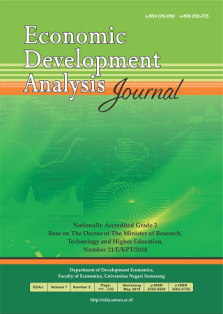Impact of Minimum Wage and Sectoral Growth on Inflation
Abstract
Inflation is one of the macroeconomic problems faced by every country. Inflation reduces the purchasing power of money. Inflation occurs due to cost-push inflation, demand-pull inflation, and rising expectations. The main objectives of this study are to analyze the impact of the minimum wage on inflation, evaluate the effect of agricultural sector growth on inflation, examine the impact of industrial sector growth on inflation, and identify the impact of service sector growth on inflation. In order to attain these goals, an examination was conducted utilizing Eviews with panel data spanning from 2013 to 2022 across 38 regions in East Java. After conducting tests on different models, it has been determined that the REM model is the most optimal. Analyzing the results obtained through the REM model reveals that the impact of minimum wage on inflation is positive but not statistically significant. The growth of the agricultural sector has a positive and significant effect on inflation. The growth of the industrial sector has a positive and insignificant effect on inflation. Growth in the service sector has a positive and significant effect on inflation.


